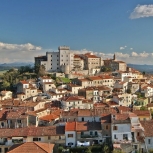
Rosignano Marittimo
Although Tuscany is among the most developed regions, the territory of Rosignano-Marittimo has been defined as an area suffering from a complex crisis due to the partial disengagement of the chemical and manufacturing industry settled in the hamlet of Rosignano Solvay. Such situation led the Italian government to allocate specific funds to support the transition of Rosignano’s economy towards sustainable and innovative business.
Indeed, in the last years, the Municipality of Rosignano-Marittimo took a strong stance on environmental sustainability and circular economy to relaunch its socio-economic development. Such commitment notably led to the early adoption of dedicated conventions and initiatives, such as : the Aalborg Charter in 1994, the launch of the process for Agenda 21 in 2000, subscribing the Aalborg commitments in 2004. In 2013, Rosignano-Marittimo also signed the Covenant of Mayors and implemented its Local Action Plan for Sustainable Energy.
Thanks to its participation to other national and European national projects, the city of Rosignano-Marittimo strives for improving its policies with an active participation in initiatives and projects in the following fields: theimplementation of a cross-border action plan for preventing and reducing risks caused by the effects of climate change in urban areas, the launch of a circular economy plan involving a strong collaboration with its in-house waste treatment company in order to ensure the supply of secondary raw materials, as well as tan innovative project for the urban sustainable regeneration of the centre of Rosignano-Solvay.
With regards to the canteen system for schools, the city has tried to integrate the principles of sustainablity and circular economy notably by mostly delivering organic and local food to school children. Based on its participation in the BioCanteens Transfer Network, together with the cities of Mouans-Sartoux (France) and Troyan (Bulgaria) in Phase 1, Rosignano-Marittimo will strive for improving its collective school catering scheme, according to the principles of sustainablity and circular economy, as well as to support the development of a greener and healthier local agri-food system.
